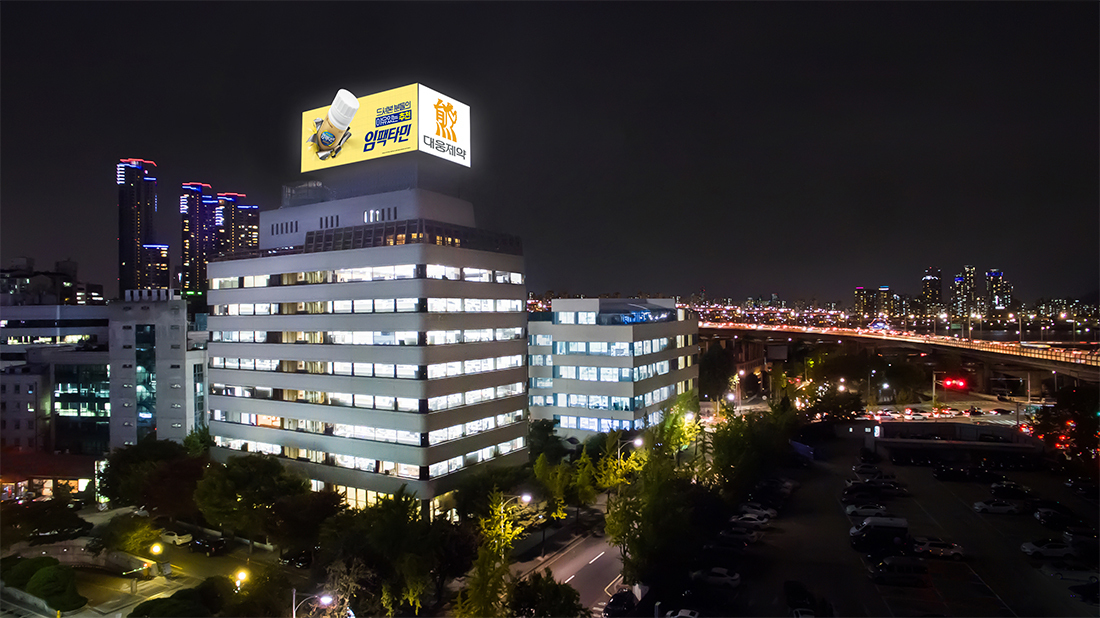Niclosamide removes coronavirus in ferret in 3 days: Daewoong
By Lim Jeong-yeoPublished : June 5, 2020 - 17:04

Daewoong Pharamaceutical and its subsidiary Daewoong Therapeutics said Friday that their proposed COVID-19 treatment DWRX2003 (niclosamide) has been found capable of removing the SARS-CoV-2 virus in a ferret’s lungs in three days.
Daewoong Therapeutics, in collaboration with Chungbuk National University, carried out preclinical animal tests of DWRX2003 in ferrets infected with SARS-CoV-2.
In a lung tissue biopsy conducted three days into the administration, the researchers found that all traces of the virus had disappeared from the ferret’s lungs, Daewoong Therapeutics said.
The disappearance of the virus inhibited the inflammatory cytokine secretion, showing inflammation prevention effects.
Daewoong Therapeutics has handed over the baton to Daewoong Pharmaceuticals to continue on the development with human clinical trials.
Sample drugs for trials are currently being manufactured, the companies said.
Niclosamide is a substance used in tapeworm infestation drug for animals. Institut Pasteur Korea has been repurposing the drug as a potential lung disease treatment and found that it could also be used for COVID-19 indication, upon which it was licensed out to Daewoong Therapeutics.
Niclosamide is known to be 40 times more potent than Gilead Science’s remdesivir, which is now globally recognized as a viable treatment for COVID-19.
One problem with niclosamide is that the drug does not absorb well in human body. Finding the right way of drug administration is key to the research, according to industry sources.
Daewoong Pharmaceutical said that it plans to apply for a phase 1 clinical trial in Korea in July to test the toxicity of DWRX2003 in humans. While it has to wait to learn the results, it said the preclinical test on ferrets indicated promising results, as ferrets have a similar respiratory structure to humans.
By Lim Jeong-yeo (kaylalim@heraldcorp.com)
Daewoong Therapeutics, in collaboration with Chungbuk National University, carried out preclinical animal tests of DWRX2003 in ferrets infected with SARS-CoV-2.
In a lung tissue biopsy conducted three days into the administration, the researchers found that all traces of the virus had disappeared from the ferret’s lungs, Daewoong Therapeutics said.
The disappearance of the virus inhibited the inflammatory cytokine secretion, showing inflammation prevention effects.
Daewoong Therapeutics has handed over the baton to Daewoong Pharmaceuticals to continue on the development with human clinical trials.
Sample drugs for trials are currently being manufactured, the companies said.
Niclosamide is a substance used in tapeworm infestation drug for animals. Institut Pasteur Korea has been repurposing the drug as a potential lung disease treatment and found that it could also be used for COVID-19 indication, upon which it was licensed out to Daewoong Therapeutics.
Niclosamide is known to be 40 times more potent than Gilead Science’s remdesivir, which is now globally recognized as a viable treatment for COVID-19.
One problem with niclosamide is that the drug does not absorb well in human body. Finding the right way of drug administration is key to the research, according to industry sources.
Daewoong Pharmaceutical said that it plans to apply for a phase 1 clinical trial in Korea in July to test the toxicity of DWRX2003 in humans. While it has to wait to learn the results, it said the preclinical test on ferrets indicated promising results, as ferrets have a similar respiratory structure to humans.
By Lim Jeong-yeo (kaylalim@heraldcorp.com)




![[Herald Interview] 'Amid aging population, Korea to invite more young professionals from overseas'](http://res.heraldm.com/phpwas/restmb_idxmake.php?idx=644&simg=/content/image/2024/04/24/20240424050844_0.jpg&u=20240424200058)












![[KH Explains] Korean shipbuilding stocks rally: Real growth or bubble?](http://res.heraldm.com/phpwas/restmb_idxmake.php?idx=652&simg=/content/image/2024/04/25/20240425050656_0.jpg&u=)

